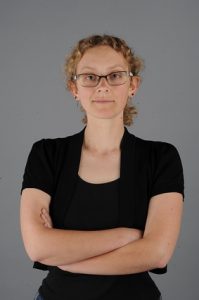 Today, we’re talking with one of our MSJ alum, Alanna McFall, who has her first full-length book, The Travelling Triple-C Incorporeal Circus, due out in June 2019.
Today, we’re talking with one of our MSJ alum, Alanna McFall, who has her first full-length book, The Travelling Triple-C Incorporeal Circus, due out in June 2019.
DV: Tell us a bit about yourself!
Alanna McFall: My name is Alanna McFall and I’m a writer based out of the Bay Area in California. I’m originally from Minnesota, but I’ve spent the last handful of years bouncing back and forth between the coasts. I’ve been publishing short stories and ten-minute plays for a while now (including a few with Mad Scientist Journal, mostly about some bedraggled minions working under an evil overlord), but this is my first full-length novel. I spend most of my non-writing time working as an administrator at a circus theater in Oakland, and visiting my fiance Andrea who lives up in British Columbia.
DV: What inspired you to write The Travelling Triple-C Incorporeal Circus?
AM: This is going to sound ridiculous, but a random prompt generator, actually. I was coming up with what I wanted to write for National Novel Writing Month in 2014 (an online writing competition where people try to write 50,000 words in the month of November) and no ideas were really sticking. I clicked through a prompt generator a few times mostly as a writing exercise, and ended up with something about ghosts and road trips. I had already been toying with the idea of a story about mimes, and somehow the two got combined in my head. I sprinted through the first draft for that year’s Nano, then spent the next very long while sorting it out into something coherent.
DV: This book has a main character but several other very significant characters in the cast as well. Which of the characters in The Travelling Triple-C Incorporeal Circus did you find the easiest to write? And which one was the most difficult?
AM: Out of the main trio, I probably found Chelsea, the point-of-view character, the easiest to write, as I got to spend so much time in her head that writing her voice came across as very natural to me after a while. She is also probably the character who is most similar to me in attitude. If we expand it out past the main group, one of the ghosts they meet along the way named Jamie ended up being my favorite to write, as she probably has the most of my personal style and mannerisms.
The trickiest for me to write was Carmen, the woman serving as a sort of ghostly mentor to Chelsea. She is probably the most different from myself, and I wanted to find good ways to make her an occasional obstacle without being deliberately obstructive. She can be very stubborn about how things “should” be done, but I wanted to make it clear that it comes from a place of concern and love.
DV: The ghosts you present come from a variety of backgrounds and cultures. Were there any particular mythologies or belief structures that colored the way you portrayed ghosts? Are there specific sorts of people in your novel’s world that either don’t become ghosts or always become ghosts?
AM: I didn’t so much base my ghosts around specific mythologies as much as I picked and chose what tropes and ideas I wanted to include, for what fit best with the story I wanted to tell. But the core idea I kept coming back to is that these ghosts are the echoes of incredibly strong emotions that were felt at the moment of their deaths. They felt so much as they were dying that their soul/being/essence/what-have-you couldn’t just end when their bodies did. For someone like Chelsea, who dies in a random accident, that could be shock. For someone like Carmen, who dies by violence, that could be anger or fear.
But beyond just emotion, there has to be a sense that there is something central in their lives that they have not completed yet, the classic “unfinished business”. These ghosts are largely powered by emotion and drive, which becomes incredibly frustrating for them when they don’t have any ways to influence the world around them with that motivation. Being a ghost is inherently unsatisfying, because as soon as you’re satisfied, you have no more reason to be a ghost.
DV: What’s on the horizon for you?
AM: I have actually been working on playwriting a lot in the past year, which is continuing forward. I am a part of the Writer’s Pool for the Monday Night PlayGround program in Berkeley; every month, the members of the pool are given a prompt and four days to write a ten-minute play, and the best six of those scripts are given a staged reading on the first Monday of the month. I have found I thrive with prompts and quick deadlines, so I have had a lot of fun writing some truly wild stuff. My latest piece was a ten-minute jukebox musical using a Cyndi Lauper song, so the program has definitely pushed me to some fun places I wouldn’t have discovered otherwise.
One of my short plays from last season, “Sh*t Farming for Fun and Profit”, was commissioned to be expanded into a full-length play through the Planet Earth Arts program, so with the book finished up, I am having time to dig into that. It is a story about a family composed of a farmer, an environmental scientist, and their two children, and how they navigate their different causes and relationships. I am hoping to get working on another novel soon, but some time to toy around with shorter ideas again will be lovely.
Thanks, Alanna! To learn more about The Travelling Triple-C Incorporeal Circus, check out the Atthis Arts website. Also check back next week, when we’ll have a review of this book!
Follow us online: